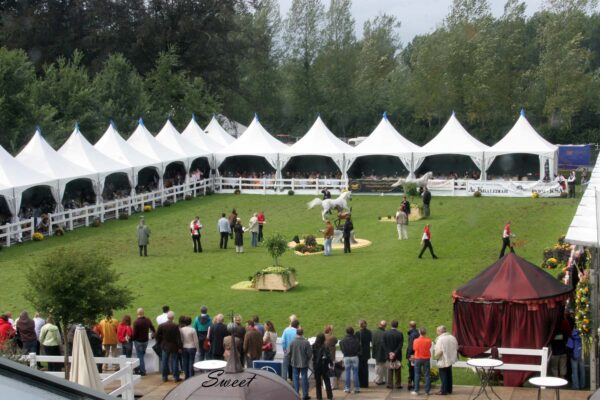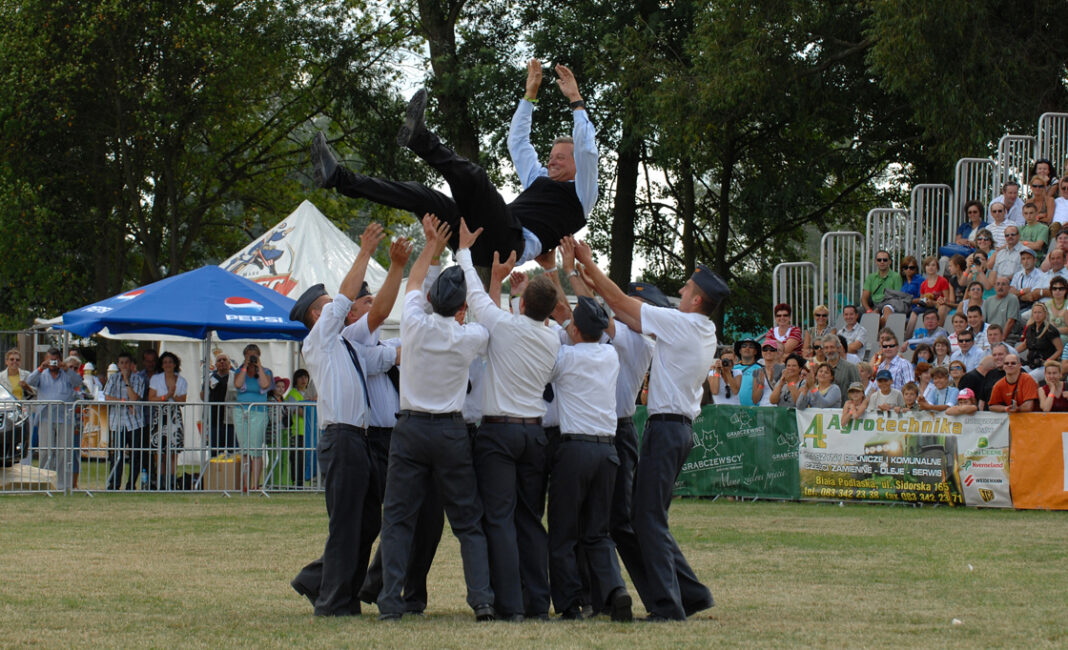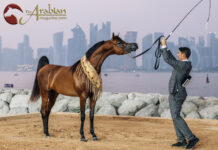Back in the 2010s, we ran a feature in The Arabian Magazine called Arabian Voice, all about highlighting areas of the Arabian world that were cause for concern. As we enter a new year of showing, we wanted to share a slightly more tongue-in-cheek column, all about those who give up their time to run shows year in, year out.
Remind me again… Why did I volunteer?
I cannot remember how many years ago it was that I first said, ‘I’ll do that’, but it seems to have stuck!
Remember the volunteer when you go to a show: show organisers, tea makers, sandwich makers, someone has to put those tents up, muck out the stables, put catalogues together. And then there are stable managers, hospitality, announcers, judges, stewards, DC – the list goes on. These are all volunteers who give up their valuable time for the love of the Arabian and to create a great opportunity for exhibitors and owners to show their horses. I am sure many people think that all these people do it for money or to fuel another agenda. If those people exist, then they are few and far between.
I have been involved with Arabians at shows for over 30 years, and I have done all the above jobs, so I think I speak from some level of experience. While we all volunteered to help, what I would ask is that when you meet us on the day, please give us a little bit of understanding and a level of respect.

At many shows in many countries, there are groups of willing volunteers, and often their less than willing families, who put aside part of their lives to run a successful and well-organised show. The Arabian horse world could not survive without them. These are the people that leave their own horses at home in order to run a show instead.
Consider running a show these days. I wonder just how many people would be prepared to do the following:
- One year to six months before the show: travel 100+ miles at least four times a year for committee meetings; write and confirm to judges, DC, marquee hire, hotels, rosette and trophy companies, toilet hire companies, showground owners, caterers, stewards, sponsors; create and issue show schedule.
- One month before the show: take entries by post, fax and e-mail; try to work out which classes exhibitors had intended to enter…; try to sort out stabling requests from several exhibitors who want to be stabled next to a friend (who hasn’t entered), away from show-rings, away from colts/stallions/chestnuts/anything, close to the lorry park, not facing south; arrange for the catalogue to be printed and collected.
- One week before the show: arrive at the showground to erect marquees, show-rings, lay electrical lines for announcers; discover that the hotel has been double booked and you have nowhere for your judges and officials to stay; discover that one of the judges has not booked their flight and now books a flight costing five times the original cost, has to return home on a flight due to leave two hours after the final class – from an airport 50 miles away, is bringing most of their family and needs several hotel rooms, is sick and cannot come to the show, or is bringing children and expects show organiser to baby-sit during the show; rosettes have not arrived resulting in frantic call to company; exhibitors telephone to ask if it would be ok to make a late entry.
- A week to two days before the show: leave home after having left copious lists for: partner on how to feed themselves, the children and the cat, friends looking after your horses including instructions that always include ‘any problems, phone me on…’, anyone looking after your plants; go shopping for tea/coffee/water/energy drinks/alcohol etc; fill car with all paperwork for show, food, drink, clothes (including enough spare warm or waterproof clothing for foreign judges); consider packing kitchen sink, just in case.
- The night before the show: repair the marquees, temporary stables and show-rings following heavy rain and high winds; dress the VIP and judges/officials’ tents with tables, chairs, and flowers; rosette company finally deliver rosettes that need sorting into class order – and discover some rosettes are missing; collect catalogues to discover pages missing; collect judges/DC/stewards from airports/train stations and deliver to hotel; sort out alternative accommodation for judges/DC/stewards because room is not to their standard; return to showground to sleep in spare stable because you’ve given up your hotel room to judges/DC/ stewards; try to get to sleep among partying exhibitors; finally get to sleep around 3am with friend’s dog snoring alongside you.
- The morning of the show: wake at 4.30am to horses arriving on showground, with exhibitors having been told not to arrive before 6am; friend’s dog wants to play, so you get up; quick wash, due to no hot water in showers, and a cup of coffee; sort out demands of arriving exhibitors who are not stabled exactly where they wanted to be; open up show office and begin to distribute exhibitor numbers, catalogues etc; sort out complaints from exhibitors whose horse is not in catalogue/spelt wrong/entered in wrong class; open up VIP and officials tents to discover that someone has been in overnight and emptied all food/drink/alcohol from under table; send member of family/friend off to local shop for more supplies; try hard to ensure that the show starts on time; panic when judges are not on showground five minutes before first class.
The show begins, and so does the hard work. All that has gone before was just a training exercise. Tears, laughter, arguments and hugs usually happen in various amounts throughout the day.
At some point, at the end of the day, when all exhibitors have gone home and the judges are at the airport or safely at their hotel, do the show organiser and committee go home too? No chance! Now starts the job of cleaning out all the stables that exhibitors left dirty, dismantling tents, collecting in show-rings, emptying VIP and officials tents, pack up cars and horseboxes, drive home – and be ready to go back to work the following day. Yes. Work. So many of the people that run the shows that so many of us enjoy have full-time paid employment, a world away from the Arabian horse.
So, I ask again, who would take this on as a willing volunteer? Well. Lots of us, it would seem!
Where will I be next? At the UK Nationals, of course! I will be doing a lot of what I have just written about, but I will also be among some of the best friends I could ever have and surrounded by the fabulous Arabian horse. I will be in my natural habitat – the judges and officials’ tent, washing up for three days, and loving every minute of it.
The Arabian horse has given us all a family and an interest, or obsession, and I personally wouldn’t have it any other way.











